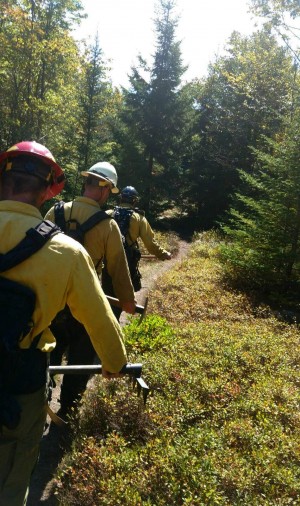
U.S. Forest Service firefighters carrying hand tools make the four-mile hike to the scene of one of five small wildfires now burning in the Dolly Sods Wilderness Area. Access has been closed to the public in these areas.
CHARLESTON, W.Va. — Since unexploded mortar shells and forest fires don’t safely mix, the U.S. Forest Service has closed public access to the southwestern portion of the Dolly Sods Wilderness Area, including five popular hiking trails, until five small wildfires are either 100 percent contained by firefighters or extinguished by rainfall, expected to arrive today and continue Friday.
The first of the fires, each of which has burned less than an acre, was detected on Sept. 16, while the others were spotted Sept. 22, 23, 25 and Wednesday. “Three of the five fires were unattended campfires that crept out of their rings,” while the causes of the fourth and fifth remain under investigation, said Amy Luebke, fire information officer for the Monongahela National Forest.
While the fires are small, safety protocols call for keeping people at least a half-mile away from them due to the possible presence of unexploded military ordnance — still-live mortar and artillery shells used during U.S. Army training exercises atop the 4,000-foot-high Tucker County plateau in 1943 and 1944 to prepare troops for the invasion of Italy. Dolly Sods was part of the Army’s West Virginia Maneuvers Area, which used several remote tracts within the Potomac Highlands to train troops bound for combat in Europe. More than 100,000 soldiers took part in 8-week training cycles in the area.
In 1946, the year after the war ended, Army Engineer Bomb and Shell Disposal Team No. 6 found and destroyed 189 live mortar shells and four live artillery shells during a sweep of the remote, wind-swept tract. Follow-up sweeps in the 1980s and ’90s using more sophisticated equipment turned up 57 more unexploded mortar and artillery shells. Since then, hikers have found and reported several additional live mortar and artillery rounds, with the most recent find taking place during Memorial Day weekend in 2014, when a Maryland Boy Scout group backpacking in the wilderness discovered, photographed, mapped and reported an unexploded mortar round near the junction of two trails.
To date, only one person is known to have been injured from the Dolly Sods ordnance. While hunting in Dolly Sods as a teenager in 1951, Wallace Dean suffered severe leg injuries when a companion picked up a mortar shell and set it down on a rock, causing it to explode. Dean later became an ecologist for the Army Corps of Engineers and served on a Corps’ project team that cleared unexploded ordnance from Dolly Sods during the 1990s.
Before firefighting crews arrived at the fires now burning in the wilderness area, an Army Corps of Engineers unexploded ordnance specialist visually inspected the fire perimeters and used a magnetometer to sweep the sites for possible mortar and artillery shells, finding none.
“He did find a bobby pin, which made everyone feel confident about the equipment he was using,” Luebke said.
In addition to possible encounters with unexploded ordnance, Dolly Sods’ designation as a wilderness area presents other challenges to firefighters, since motorized vehicles are banned, along with motorized equipment like chain saws and leaf blowers, unless one-time exemptions are sought and approved. Firefighters at Dolly Sods received permission to use a motorized pump to operate a small sprinkler system on one of the fires, using water from a nearby stream.
“Horses were used to pack in that equipment,” Luebke said. In other cases, firefighters used backpack-mounted water bladders to hose down hot spots. Firefighters have been carrying in their own gear, hiking four miles from the nearest road to reach the fire scenes.
As of mid-day Wednesday, three of the fires were considered 80 to 100 percent contained, Luebke said. “We’re making progress,” she said. “But a good, soaking rain would be a really good thing.”
Hiking trails now closed to public use due to an emergency closure order are Big Stonecoal, Little Stonecoal, Breathed Mountain, Rocky Point and Dunkenbarger trails. Blackbird Knob Trail and trails to the north of it in what was formerly the Dolly Sods North wilderness study area remain open.
The extremely dry conditions prompted Monongahela National Forest officials on Friday to ban campfires and charcoal grill use throughout the Dolly Sods Wilderness, as well as in the nearby Red Creek Campground and Dolly Sods Picnic Area, which remains in effect. Gas-powered grills and backpacking stoves may be used.
Reach Rick Steelhammer at [email protected], 304-348-5169 or follow @rsteelhammer on Twitter.



